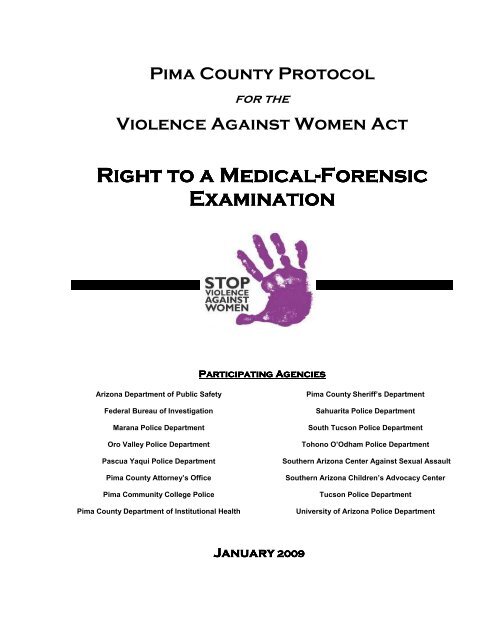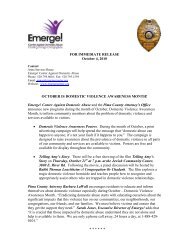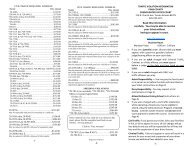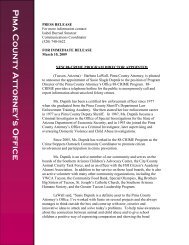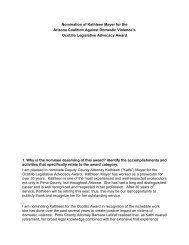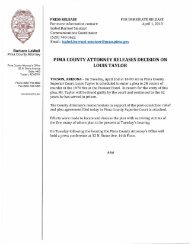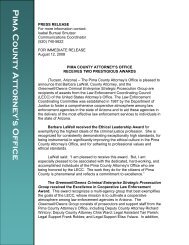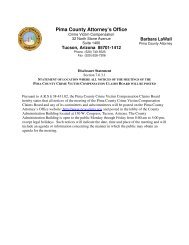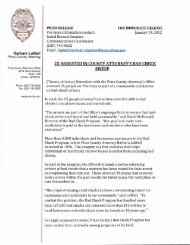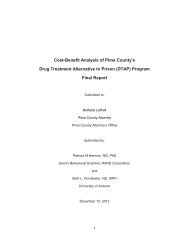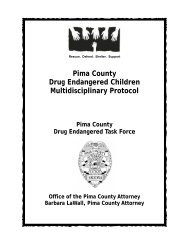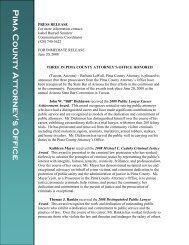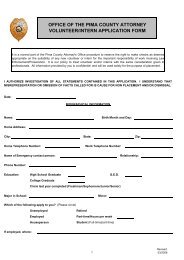Sex Assault Protocol - Pima County Attorney
Sex Assault Protocol - Pima County Attorney
Sex Assault Protocol - Pima County Attorney
You also want an ePaper? Increase the reach of your titles
YUMPU automatically turns print PDFs into web optimized ePapers that Google loves.
<strong>Pima</strong> <strong>County</strong> <strong>Protocol</strong><br />
for the<br />
Violence Against Women Act<br />
Right to a Medical-Forensic<br />
Examination<br />
Participating Agencies<br />
Arizona Department of Public Safety<br />
Federal Bureau of Investigation<br />
Marana Police Department<br />
Oro Valley Police Department<br />
Pascua Yaqui Police Department<br />
<strong>Pima</strong> <strong>County</strong> <strong>Attorney</strong>’s Office<br />
<strong>Pima</strong> Community College Police<br />
<strong>Pima</strong> <strong>County</strong> Department of Institutional Health<br />
<strong>Pima</strong> <strong>County</strong> Sheriff’s Department<br />
Sahuarita Police Department<br />
South Tucson Police Department<br />
Tohono O’Odham Police Department<br />
Southern Arizona Center Against <strong>Sex</strong>ual <strong>Assault</strong><br />
Southern Arizona Children’s Advocacy Center<br />
Tucson Police Department<br />
University of Arizona Police Department<br />
January 2009
This protocol was developed by a collaboration of the following agencies: Arizona<br />
Department of Public Safety Crime Lab, Federal Bureau of Investigation, Marana<br />
Police Department, Pascua Yaqui Police Department, <strong>Pima</strong> <strong>County</strong> <strong>Attorney</strong>’s<br />
Office Victim Witness Program and Special Victims Unit, <strong>Pima</strong> Community<br />
College Police, <strong>Pima</strong> <strong>County</strong> Department of Institutional Health, <strong>Pima</strong> <strong>County</strong><br />
Sheriff’s Department, South Tucson Police Department, Tohono O’Odham Police<br />
Department, Southern Arizona Center Against <strong>Sex</strong>ual <strong>Assault</strong>, Southern Arizona<br />
Children’s Advocacy Center, Tucson Police Department Crime Lab, Tucson<br />
Police Department, University of Arizona Police Department, Oro Valley Police<br />
Department, and the Sahuarita Police Department.<br />
This document may be reproduced entirely or in part for legitimate purposes.<br />
Kindly cite reprinted materials appropriately.<br />
For further information, please contact:<br />
Kent Burbank, Director<br />
Victim Witness Program<br />
<strong>Pima</strong> <strong>County</strong> <strong>Attorney</strong>’s Office<br />
32 N. Stone Avenue, Suite 1400 — Tucson, AZ 85701<br />
(520) 740-5530<br />
--OR--<br />
Sheronda Jordan, Forensic Examiner Manager<br />
Southern Arizona Center Against <strong>Sex</strong>ual <strong>Assault</strong><br />
1600 N. Country Club — Tucson, AZ 85716<br />
(520) 327-1171<br />
January 2009
<strong>Pima</strong> <strong>County</strong> <strong>Protocol</strong> for<br />
<strong>Sex</strong>ual <strong>Assault</strong> Victims Who Request a Medical-Forensic Exam<br />
This protocol outlines how <strong>Pima</strong> <strong>County</strong> will provide medical-forensic exams to<br />
victims of sexual assault, age 13 and older, who present within 120 hours postassault,<br />
regardless of whether they choose to report the assault to law<br />
enforcement.<br />
The protocol was developed to address revisions to the Violence Against Women<br />
Act (VAWA) which stipulates that, in order for a state to comply with VAWA and be<br />
eligible for funds, it must demonstrate that procedures are established to ensure<br />
that sexual assault victims have access, at no charge, to a medical-forensic exam<br />
– and that their access to this exam is not contingent upon participation in the<br />
criminal justice system.<br />
<strong>Protocol</strong>:<br />
• A victim will report having been sexually assaulted to an agency (i.e., law<br />
enforcement, hospitals, the Southern Arizona Center Against <strong>Sex</strong>ual<br />
<strong>Assault</strong>).<br />
• If the victim is a minor, law enforcement shall contact the Southern Arizona<br />
Children’s Advocacy Center (SACAC) as needed and protocols shall be<br />
adhered to, per <strong>Pima</strong> <strong>County</strong> <strong>Protocol</strong>s for the Multidisciplinary Investigation<br />
of Child Abuse.<br />
• If SACAC refers calls involving minors to the Southern Arizona Center<br />
Against <strong>Sex</strong>ual <strong>Assault</strong>, or if the victim is an adult, the agency (law<br />
enforcement, hospitals, or SACAC) will dispatch a <strong>Sex</strong>ual <strong>Assault</strong> Resource<br />
Service (SARS) Advocate to the hospital by calling 520-349-8221.<br />
• The SARS Advocate shall inform the victim of his/her rights/options related<br />
to reporting, medical care, and the medical-forensic exam. The SARS<br />
Advocate will provide the victim with a copy of the attached <strong>Sex</strong>ual <strong>Assault</strong><br />
Victim Rights Statement.<br />
• If the agency or entity in which the victim makes the report has determined<br />
that they have a mandate or duty under ARS § 13-3806 1 to report the<br />
sexual assault, the agency or entity shall do so following their established<br />
policy and procedures.<br />
• If the victim is a minor, the responding agencies shall contact Child<br />
Protective Services per ARS 13-3620 (see <strong>Pima</strong> <strong>County</strong> <strong>Protocol</strong>s for the<br />
Multidisciplinary Investigation of Child Abuse).<br />
• If the victim chooses to make a report to law enforcement, information is<br />
received by the responding officer and the law enforcement agency decides<br />
whether the case will be investigated.
o If law enforcement determines that a medical-forensic exam will benefit<br />
their investigation, the SARS Advocate will dispatch a <strong>Sex</strong>ual <strong>Assault</strong><br />
Nurse Examiner (SANE).<br />
o Law enforcement will provide the SANE with a case number.<br />
o The SANE will contact law enforcement when the <strong>Sex</strong> Crime Evidence<br />
Kit is ready for pick-up and an officer will transport the kit to evidence.<br />
• If the victim chooses to have a medical-forensic exam without cooperating with<br />
law enforcement, the SARS Advocate will dispatch a <strong>Sex</strong>ual <strong>Assault</strong> Nurse<br />
Examiner (SANE).<br />
o The hospital will call law enforcement per ARS § 13-3806 1 and provide<br />
the following information:<br />
Name of victim/patient<br />
Description of victim/patient<br />
Character of wound or other facts<br />
o Law enforcement will provide a case number to hospital personnel.<br />
o Hospital staff will provide the case number to the SARS Advocate and<br />
SANE.<br />
o The SANE will contact law enforcement when the <strong>Sex</strong> Crime Evidence<br />
Kit is ready for pick-up and an officer will transport the kit to evidence or<br />
the SANE will store the kit in a mini-refrigerator at Tucson Medical<br />
Center or Northwest Medical Center and the Forensic Examiner<br />
Coordinator will arrange pick-up with the appropriate law enforcement<br />
agency.<br />
o Law Enforcement will classify the <strong>Sex</strong> Crime Evidence Kit as 61-05<br />
Exam, no criminal prosecution.<br />
• The <strong>Sex</strong> Crime Evidence Kit will be stored for one year.<br />
• After one year, the <strong>Pima</strong> <strong>County</strong> <strong>Attorney</strong>’s Office (PCAO) shall review the<br />
case prior to destroying the <strong>Sex</strong> Crime Evidence Kit.<br />
• A SARS Advocate with the Southern Arizona Center Against <strong>Sex</strong>ual <strong>Assault</strong><br />
shall make an effort to contact victims 18 and over via phone or by mail 30<br />
days before PCAO reviews the case, in an effort to remind the victim that the<br />
<strong>Sex</strong> Crime Evidence Kit may be destroyed.<br />
• The victim can make a report to law enforcement at any time. If the victim<br />
decides to make a report to law enforcement, a statement is taken and the <strong>Sex</strong><br />
Crime Evidence Kit is made available for purposes of an investigation (if the<br />
report is made within one year of the exam date).<br />
1 ARS § 13-3806. Duty of physician or attendant upon treating certain wounds; A. A physician, surgeon, nurse or<br />
hospital attendant called upon to treat any person for gunshot wounds, knife wounds or other material injury which may<br />
have resulted from a fight, brawl, robbery or other illegal or unlawful act, shall immediately notify the chief of police or the<br />
city marshal, if in an incorporated city or town, or the sheriff, or the nearest police officer, of the circumstances, together with<br />
the name and description of the patient, the character of the wound and other facts which may be of assistance to the police<br />
authorities in the event the condition of the patient may be due to any illegal transaction or circumstances. B. Any violation<br />
of the provisions of this section by a physician, surgeon, nurse or hospital attendant, is a class 3 misdemeanor.
Statement of a victim’s right to a medical-forensic exam<br />
As a victim/survivor of sexual assault, you have the right to a medicalforensic<br />
exam, at no cost to you. You have the right to this exam regardless<br />
of whether you cooperate with law enforcement and prosecution.<br />
What is a Medical-Forensic Exam?<br />
A medical-forensic exam is a comprehensive medical exam performed by a<br />
<strong>Sex</strong>ual <strong>Assault</strong> Nurse Examiner/<strong>Sex</strong>ual <strong>Assault</strong> Forensic Examiner<br />
(SANE/SAFE) who is a specially trained Registered Nurse, Nurse<br />
Practitioner, Physician’s Assistant or Physician with advanced education<br />
and clinical preparation.<br />
The SANE/SAFE will do the following during the medical-forensic exam:<br />
o Obtain a detailed history of the assault or abuse<br />
o Provide a detailed head-to-toe examination<br />
o Perform a detailed genital examination, which may include an<br />
examination with a speculum<br />
o Collect biological or trace evidence from your body<br />
The medical-forensic care you receive from the SANE/SAFE is being<br />
provided at no cost to you; however, there may be costs related to your<br />
medical care provided by the emergency department staff including labs,<br />
tests, and medications. The <strong>Sex</strong>ual <strong>Assault</strong> Resource Service (SARS)<br />
Advocate or SANE/SAFE can arrange for you to speak with emergency<br />
department staff if you have questions about billing.<br />
The evidence collected may help with the identification and prosecution of<br />
the perpetrator of the crime. Without this evidence, it is often more difficult<br />
to identify and/or prosecute the person who committed the sexual assault.
Facts to consider when deciding on<br />
a medical-forensic exam<br />
You can receive medical care without having a medical-forensic exam.<br />
o Hospital staff can provide medications, including medications to<br />
prevent sexually transmitted infections (STI) and Plan B® to prevent<br />
pregnancy.<br />
o A physician can treat you for any injuries you have as a result of the<br />
assault<br />
You can receive advocacy provided by a specially trained <strong>Sex</strong>ual <strong>Assault</strong><br />
Resource Service (SARS) Advocate without having a medical-forensic<br />
exam.<br />
The exam often takes several hours to complete and victims are asked to<br />
refrain from certain activities during this time (i.e., drinking, eating, smoking,<br />
and using the bathroom).<br />
Over time, evidence is lost, begins to degrade, or becomes contaminated,<br />
and is difficult or impossible to process. After a certain point, typically<br />
around 120 hours (five days after an assault), most experts believe that<br />
little or no useful evidence will be collected during a medical-forensic exam.<br />
Even when a medical-forensic exam is performed immediately after a<br />
sexual assault, sometimes there isn’t much evidence that can be collected.<br />
You can make a report to law enforcement at any time; however, your<br />
kit may be destroyed within one year of receiving the medical-forensic<br />
exam.<br />
Any delay in the investigation may substantially reduce the ability of law<br />
enforcement to assign or investigate the case.<br />
The biological evidence in your kit may be analyzed even if you do not<br />
cooperate with law enforcement.<br />
Law enforcement may choose to contact you, but you have the right to<br />
decide when you make a report.


